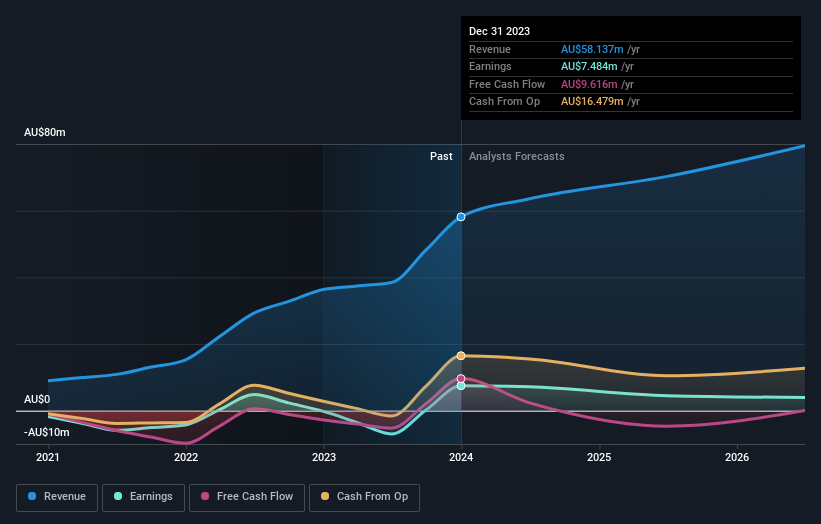With 54% ownership in PlaySide Studios Limited (ASX:PLY), insiders continue to have the largest holding even though they have sold shares recently
Key Insights
Significant insider control over PlaySide Studios implies vested interests in company growth
The top 4 shareholders own 54% of the company
A look at the shareholders of PlaySide Studios Limited (ASX:PLY) can tell us which group is most powerful. We can see that individual insiders own the lion's share in the company with 54% ownership. In other words, the group stands to gain the most (or lose the most) from their investment into the company.
Even though insiders have sold shares recently, the group owns the most numbers of shares in the company.
Let's delve deeper into each type of owner of PlaySide Studios, beginning with the chart below.
View our latest analysis for PlaySide Studios
What Does The Institutional Ownership Tell Us About PlaySide Studios?
Institutions typically measure themselves against a benchmark when reporting to their own investors, so they often become more enthusiastic about a stock once it's included in a major index. We would expect most companies to have some institutions on the register, especially if they are growing.
As you can see, institutional investors have a fair amount of stake in PlaySide Studios. This implies the analysts working for those institutions have looked at the stock and they like it. But just like anyone else, they could be wrong. It is not uncommon to see a big share price drop if two large institutional investors try to sell out of a stock at the same time. So it is worth checking the past earnings trajectory of PlaySide Studios, (below). Of course, keep in mind that there are other factors to consider, too.
Hedge funds don't have many shares in PlaySide Studios. Looking at our data, we can see that the largest shareholder is the CEO Gerry Sakkas with 16% of shares outstanding. The second and third largest shareholders are Mark Goulopoulos and Aaron Pasias, with an equal amount of shares to their name at 16%. Interestingly, the third-largest shareholder, Aaron Pasias is also a Member of the Board of Directors, again, indicating strong insider ownership amongst the company's top shareholders.
On looking further, we found that 54% of the shares are owned by the top 4 shareholders. In other words, these shareholders have a meaningful say in the decisions of the company.
While it makes sense to study institutional ownership data for a company, it also makes sense to study analyst sentiments to know which way the wind is blowing. There are plenty of analysts covering the stock, so it might be worth seeing what they are forecasting, too.
Insider Ownership Of PlaySide Studios
While the precise definition of an insider can be subjective, almost everyone considers board members to be insiders. Company management run the business, but the CEO will answer to the board, even if he or she is a member of it.
Most consider insider ownership a positive because it can indicate the board is well aligned with other shareholders. However, on some occasions too much power is concentrated within this group.
Our information suggests that insiders own more than half of PlaySide Studios Limited. This gives them effective control of the company. That means they own AU$191m worth of shares in the AU$351m company. That's quite meaningful. Most would argue this is a positive, showing strong alignment with shareholders. You can click here to see if those insiders have been buying or selling.
General Public Ownership
The general public-- including retail investors -- own 39% stake in the company, and hence can't easily be ignored. While this size of ownership may not be enough to sway a policy decision in their favour, they can still make a collective impact on company policies.
Next Steps:
I find it very interesting to look at who exactly owns a company. But to truly gain insight, we need to consider other information, too. Consider risks, for instance. Every company has them, and we've spotted 1 warning sign for PlaySide Studios you should know about.
If you would prefer discover what analysts are predicting in terms of future growth, do not miss this free report on analyst forecasts.
NB: Figures in this article are calculated using data from the last twelve months, which refer to the 12-month period ending on the last date of the month the financial statement is dated. This may not be consistent with full year annual report figures.
Have feedback on this article? Concerned about the content? Get in touch with us directly. Alternatively, email editorial-team (at) simplywallst.com.
This article by Simply Wall St is general in nature. We provide commentary based on historical data and analyst forecasts only using an unbiased methodology and our articles are not intended to be financial advice. It does not constitute a recommendation to buy or sell any stock, and does not take account of your objectives, or your financial situation. We aim to bring you long-term focused analysis driven by fundamental data. Note that our analysis may not factor in the latest price-sensitive company announcements or qualitative material. Simply Wall St has no position in any stocks mentioned.

 Yahoo Finance
Yahoo Finance 

